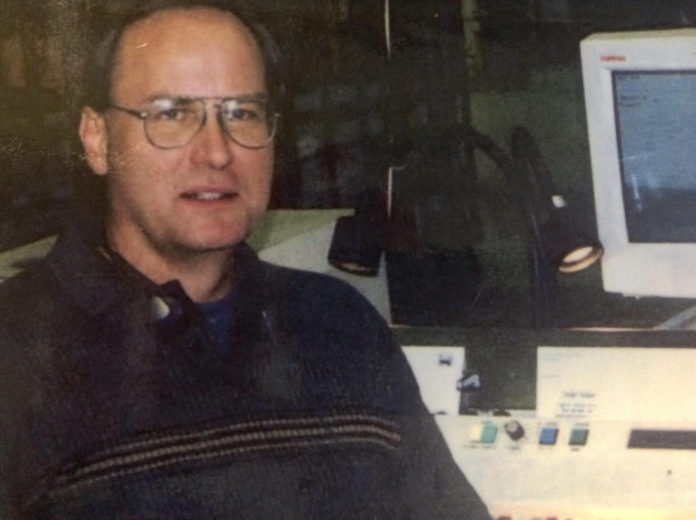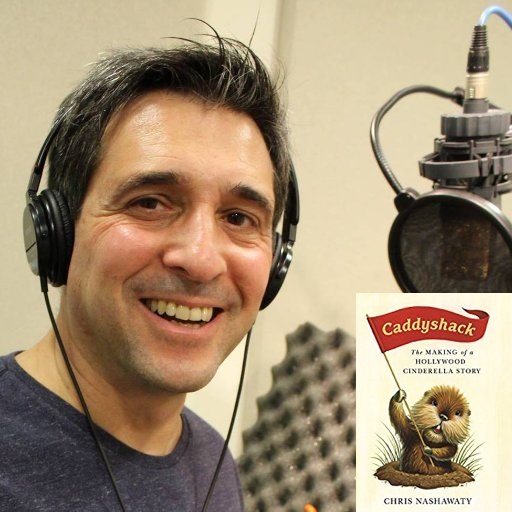Interview with Peter Berkrot
Jonathan Lowe) How did you come to voice acting?
Peter Berkrot) I started acting and training in New York in 1973 when I was in 13 or 14, so how I came to voice acting is like how I came to Massachusetts or marriage. The longer the trail, the more paths there are. My focus then was theatre, of course. I was a theatre major at SUNY New Paltz but when I was cast in Caddyshack halfway through college, I began to see my career through a more expansive lens. The majority of voice work came when I left New York in 1989 and moved to New England. Very soon, I was doing VO work for documentaries, occasionally playing the American translation voice for the on camera speakers. That eventually translated into a great relationship at WGBH in Boston where I’ve been doing that type of work for FRONTLINE since 2004.
Above: Peter Berkrot
JL) Wow. A fav movie, and a fav PBS series! As a footnote, I once communicated with Frontline’s main narrator Will Lyman, who also did the voiceover for Jonathan Goldsmith, the World’s Most Interesting Man, who has a biography out titled Stay Interesting, which Goldsmith reads on audio. Interesting story, too. Jonathan says he was living out of his truck, and was killed on screen as an extra more than anyone, until that Dos Equis commercial. Lyman can’t talk about it, still under contract. Other formats? Commercials, games, documentaries?
PB) There was a ton of industrial work in the 90’s and 00’s so I did all sorts of on camera and VO work, often playing characters with a variety of dialects. Then I did a bunch of local games, creating a character called “I.M. Meen” at the end of the MS-DOS revolution. Google it. People have taken my song and twisted it around so I’m saying all sorts of nasty things. I started looking into audiobooks in 2006 and did my first in 2007.
JL) You recorded The Art of War, a big seller. Any thoughts to share on the Machiavellian Sun Tzu philosophy, and if you think it relates in any way to Leadership and Self Deception, or maybe the stress levels described in Why Zebras Don’t Get Ulcers, both of which you’ve also narrated?
PB) I was lucky enough to come of age between wars so I never experienced the horrors of war either first or second hand. I actually always feel a bit like a fraud when I’m playing all the real life and fictitious Navy Seals and marines I do in books. For The ART OF WAR I found that I was most authentic after channelling my inner Klingon, giving context I could understand to experiences I could not. As for LEADERSHIP AND SELF DECEPTION, unlike many self-help books in the Business category which are about leveling the playing field and getting the edge on the competition, this is a much more spiritual approach to leadership, asking the listener to look within him or herself to deeply evaluate ones relationship to oneself, to others, to work and so forth. It is about growing and getting out of your own way and not blaming or undermining anyone else along the way. It’s tremendous popularity is probably attributed to the creative prose which is a series of scripted scenes and opportunities for self evaluation. There actually are some connections between THE ART OF WAR and WHY ZEBRAS DON’T GET ULCERS, although it may seem to be reaching. The ability to reduce stress will add years to your life. Planning for every contingency in battle and holding the better defensive position requires a calm and logical mind as well as strength and resolve. In Dr. Sapolsky’s book, he brilliantly illustrates through the explanation of his title why we can also live longer, though the war is internal. Stress is supposed to be a survival mechanism. If you’re a zebra running from a lion, you absolutely require the adrenaline and hormonal barrage that stress brings to make sure you’re not the slowest zebra in the herd. The moment the threat is gone, the stress levels drop to neutral and the zebra renews his strolling and grazing. A human being would lie there on the steppes and worry about the next lion until one came and he’s ‘run and worry and run and worry’ until eventually, he’d die of a heart attack or diabetes.
JL) We’d eat pizza too while worrying. Comfort food. What did you read as a teen that may have influenced you?
PB) I loved series books as most kids do. And Dr. Seuss. But I was 6 or 7 when the original STAR TREK hit the air and 12 or 13 when I saw my first Twilight Zone. Those were my major influences which drew me from the small screen to the small page. I started writing a lot of Horror and Science Fiction stories, big on time travel. Then the real reading kicked in. Robert Heinlein’s STRANGER IN A STRANGE LAND was huge for me and everything by Kurt Vonnegut. Then Catch-22 and Stephen King.
JL) You narrated a couple of Richard Matheson titles, who was a short story master, like Ray Bradbury. You’ve also done Philip K. Dick and Dean Koontz. That’s a lot of genres under the umbrella “speculative fiction.” Any preferred genre?
PB) Yes! Time Travel! Anything related to time travel! Watching STAR TREK and TWILIGHT ZONE naturally led me to Harlan Ellison, Richard Matheson, Ray Bradbury, Isaac Asimov. Of all the comic books I read as a kid I liked Legion of Super Heroes best because they were in the future. When I get to narrate anything by Philip K. Dick or the others in this genre, I feel it as an honor and a challenge, a thread connecting me to my past and my future.
JL) Another footnote, did you know Harlan Ellison is an audiobook narrator too, and he knows the scoop on both Star Trek and Scientology first hand? His tell-all is the audiobook The City on the Edge of Forever, the story behind the script he wrote. He actually saved Star Trek from cancellation, early on, by petitioning for it. Bradbury helped launch Playboy magazine, too. Fahrenheit 451 was first published in the first issues. What is next for you?
PB) In terms of books, “Caddyshack, The Making of a Hollywood Cinderella Story” by Chris Nashawaty is just released, certainly the most personal and bizarre narrating experience I had, especially quoting myself. Next I go into the booth to record BLOWN by Mark Haskell Smith, the sixth novel of his I have had the extraordinary pleasure of narrating. Funniest. Guy. Ever. Then, the opposite. The brilliantly crafted but emotionally shattering memoir THE END OF THE WORLD AS WE KNOW IT by Robert Goolrick for HighBridge Audio. And then I’ll be spending 46 hours with Dwight D. Eisenhower courtesy of Audible Studios. More books. More teaching! I haven’t talked about my teaching or private coaching but its one of my strengths and passions. More Skyping, and maybe one day I’ll save up enough money to do a play again. While I can still memorize. And walk.
JL) I once saw a woman walk into a tree while reading a print book. As I passed her with my iPod, I said one word: “Audiobooks.” Thanks for taking time for an interview.
(Former postal clerk Jonathan Lowe is author of five novels, with new audiobook productions of AWAKENING STORM and POSTMARKED FOR DEATH.)


